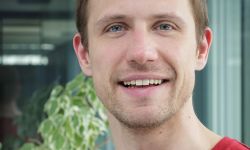
Experimental physicist Gerhard Kirchmair will receive an ERC Starting Grant for conducting quantum research with superconducting circuits. The grant, awarded by the European Research Council and valued at up to 1.5 million Euro, is the most prestigious and important award for junior scientists in Europe.
Superconducting quantum bits are among the most promising technologies to be used for applications in quantum information processing. “Compared to quantum optical experiments, superconducting circuits are relatively simple set-ups as, for example, additional cooling by lasers is not necessary,” explains Kirchmair. Superconductors that are cooled down to few millikelvin and where current flows without resistance could be used to build capacitors or coils for circuits, for example. Kirchmair uses a specific type of coils to build artificial qubits: so called Josephson junctions. Here, two superconductors are separated by an isolating oxide film, generating non-linear behavior, which is essential for quantum experiments.
Quantum simulation in a refrigerator
Within the next five years, Kirchmair is going to use the funds provided by the ERC grant to develop systems comprising up to 40 to 50 quantum bits and to conduct the first quantum simulations. “With this technology we now have a whole range of gates and operations available that are necessary for quantum information processing,” says Kirchmair. “Last year, together with Peter Zollers’s research group, we developed theoretical models for simulating solid-body phenomena with these systems.” The researchers are particularly interested in the dynamic behavior of quantum systems as it is all but impossible to simulate this behavior with classical computers. “Here lies one of the great potentials of quantum simulators,” says Kirchmair.
Rainer Blatt, Director of the IQOQI, is also excited about the grant from Brussels: “All of our young IQOQI research directors - Francesca Ferlaino, Oriol Romero-Isart and Gerhard Kirchmair – are now supported by the European Research Council, which makes them part of the European research elite. This also underlines the successful progression of physics research in Innsbruck: The new generation at the IQOQI has established itself successfully and stands for a promising future of physics research in the Tyrol.”
About
Gerhard Kirchmair, born in Hall in Tirol in 1981, graduated in physics at the University of Innsbruck. In 2006 he started working on processing quantum information using trapped ions. In 2010 he received his doctorate sub auspiciis, i.e. with special honors from the President of Austria. Kirchmair then went on to work at Yale University, USA, for two years. In 2013 he was appointed as Professor for Experimental Physics at the University of Innsbruck for a five year term. At the same time he became Junior Research Director at the Institute for Quantum Optics and Quantum Information (IQOQI), Austrian Academy of Sciences. Kirchmair has recently received a grant awarded by the Canadian Institute for Advanced Research (CIFAR) and valued at 100,000 Canadian dollars for his research in the field of quantum information processing.